Opinion Whose life is it anyway?
If a mother doesn’t want her child, who will want her/him? Unless courts or governments can find a solution to society’s unwanted children, they shouldn’t force a woman to deliver an unwanted child.
 When we can’t give justice to the children around us, whose rights are being violated with impunity, how can we talk about the rights of unborn children? (File)
When we can’t give justice to the children around us, whose rights are being violated with impunity, how can we talk about the rights of unborn children? (File) On October 17, the Supreme Court declined a married woman the permission to terminate her over 26-week pregnancy. Citing reports by a medical board, the apex court said termination was not immediately necessary.
The woman, a mother of two, who was unwilling to continue with her pregnancy, had cited in her plea that she was suffering from postpartum depression and lactational amenorrhea. Since her foetus had crossed the upper limit of 24 weeks, as per the Medical Termination of Pregnancy (MTP) Act, she had to approach the court to seek permission for abortion.
Foetal viability, a woman’s right over her body and the rights of an unborn child — all these topics were widely debated on from the time the woman approached the court, till the judgment was delivered.
The woman had mentioned that she was “not” in a position to raise a third child — emotionally, financially and mentally. It doesn’t mean that she just wanted to “kill” her foetus. The plea in itself screamed of her helplessness. Termination of pregnancy isn’t an easy decision for a mother. So when she points out reasons for the same, listen to her.
Six years ago, I happened to meet a 22-year-old mother of three at a government medical college. The woman, who belonged to a family of migrant workers from Jharkhand, was attending to her two younger children, aged three and one-and-a-half, who had been stabbed by their father. At the time I met her, the mother was unaware that her eldest son, four-and-a-half years old, had died.
Why did her husband — who she claimed was an abusive alcoholic — stab their children that fateful day? She said he was enraged over their non-stop cries for food. There was no food at home since he was out of a job and the children were hungry, she said. “He stabbed them to make them stop crying,” she told me.
As I handed her some money collected by a few friends, the malnourished mother thanked me profusely. With folded hands, she said, “Till this day, not even God has helped us.”
Her youngest one had undergone surgery and was resting in her lap, still in seemingly unwashed clothes, every inch of their bodies a testament to their poverty. The woman said she never wanted to get married or have children, but poverty forced her family to marry her off at a very young age.
Each day, we come across news reports on newborns being found in dustbins, garbage dumps, creeks or on roads. What makes these children common? They are all “unwanted” by their parents, or at least by one of them.
When we can’t give justice to the children around us, whose rights are being violated with impunity, how can we talk about the rights of unborn children? Stopping that heartbeat may perhaps be a blessing compared to the life or death in store for that child.
If a mother doesn’t want her child, who will want her/him? Unless courts or governments can find a solution to society’s unwanted children, they shouldn’t force a woman to deliver an unwanted child.
When a woman conceives, she knows that it’s not just about delivering the baby but also the years of struggle that will follow. If no one else is willing to help a woman throughout those years, the decision to keep the baby or not should be hers alone. After all, whose child is it anyway?






